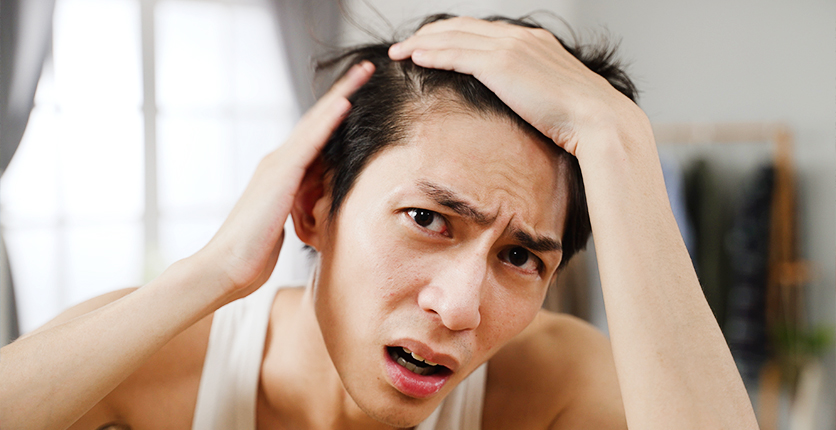Losing your hair at an especially young age can impact your self-esteem and self-confidence. It may leave you feeling ashamed or embarrassed and even cause anxiety and depression as you think about how it will affect your appearance and lifestyle. If you’ve always enjoyed a full head of hair, seeing plenty of stray hairs in your hairbrush, in your shower drain, or on your pillow upon waking up, or noticing the progressive thinning of your crown, can feel devastating.
Instead of letting it get you down, take charge of your hair loss and hair thinning issues by learning what causes it and how to deal with it.
First up: Losing a certain number of hairs every day is normal
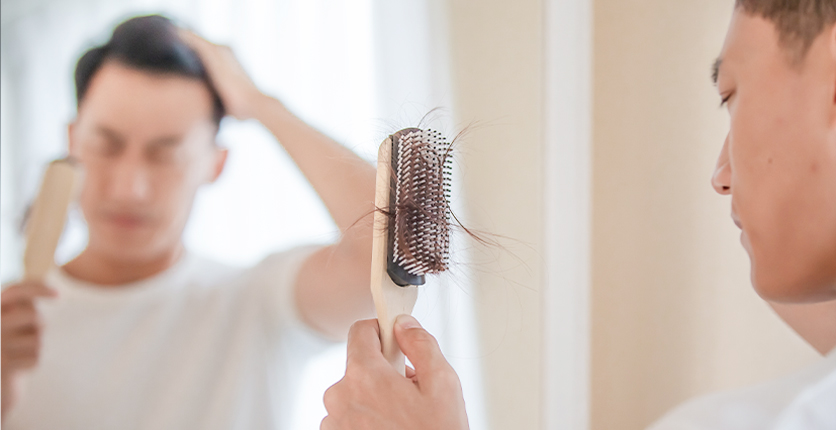
It’s perfectly normal to shed as many as 50 to 150 strands of hair a day. The average person has between 100,000 and 150,000 hair follicles on their head, 90 per cent of which are producing hair at any given time. Each strand of hair grows for two to six years before resting for approximately three months. After this resting phase, the hair sheds and is replaced by new strands that grow from the same follicles.
Hair loss, or alopecia, is not usually a big cause for concern, but it can be worrying when you start losing large amounts of hair (and particularly if you’re still in your 20s or 30s) or when new hair doesn’t grow back. Excessive hair loss is also known as balding. If you notice a loss of more than 100 hairs a day, then you may be experiencing balding.
Male pattern hair loss is mainly driven by genetics
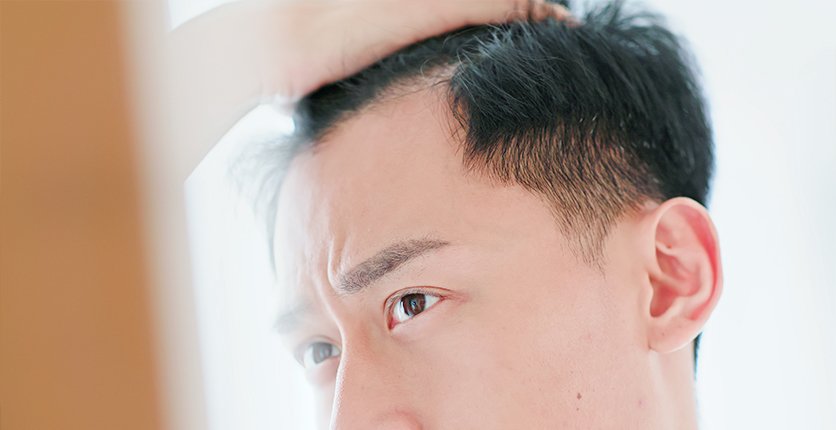
According to Dr Christopher Foo, Specialist in Dermatology and Consultant, Raffles Skin & Aesthetics, androgenetic alopecia, commonly known as male pattern hair loss, is the most common cause of baldness in men.
“This condition is due to genetics and is characterised by a distinct pattern, involving a receding hairline and hair loss at the crown,” he explains.
“Most men experience the onset for this condition between the ages of 30 and 40, however, it may occur sooner for other men.”
Hair loss may be due to other factors besides genetics
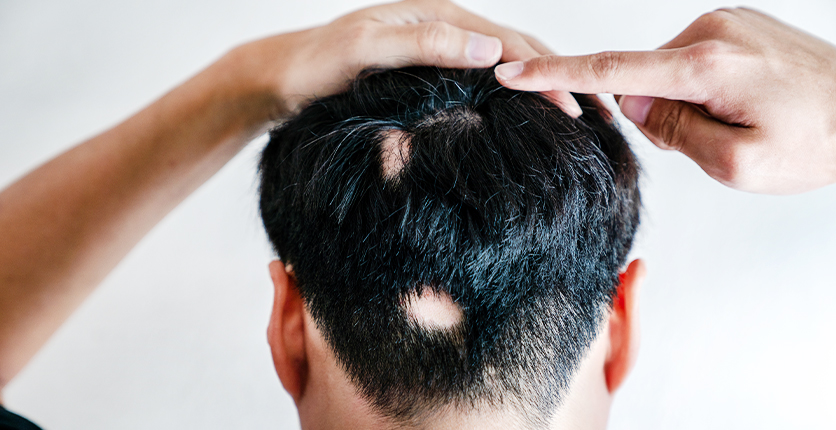
Dr Foo says that there are non-genetic causes that may result in a condition known as telogen effluvium – where an increased shedding of hair occurs over a period of time.
Some common causes include medical conditions, such as thyroid disorders or autoimmune diseases (like alopecia areata, where your immune cells attack and damage your hair follicles, resulting in a patchy loss of hair); scalp infections, such as a fungal infection or scalp inflammatory disorders; stress; obsessive pulling of hair (known as trichotillomania); the use of heat styling tools and chemical treatments; and a deficiency of nutrients like iron, protein, biotin, omega-3 fatty acids, zinc, and certain vitamins.
Adopt healthier lifestyle habits to minimise hair loss
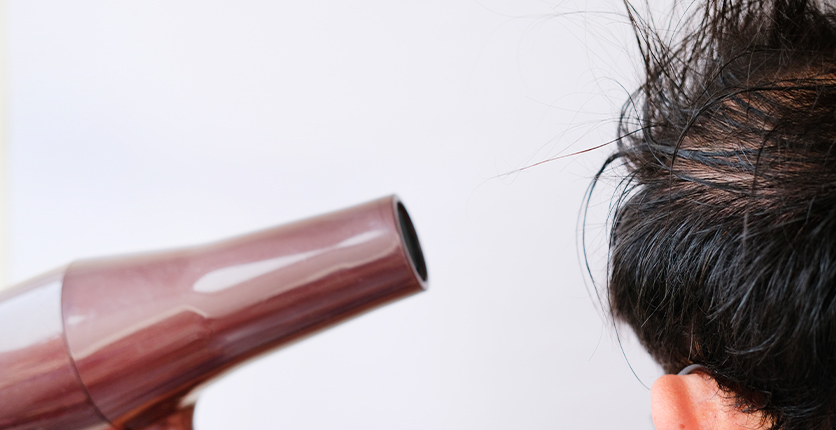
While there may not be much you can do to prevent hair loss caused by genetics, you can certainly keep your scalp and hair healthy by adopting better lifestyle habits.
These include exercising regularly to improve blood circulation to your scalp, and eating a balanced diet containing adequate protein and all the essential vitamins and minerals to ensure the health of your hair.
Additionally, it’s important to be gentle when it comes to haircare practices and hair treatments. Avoid the excessive use of heat styling tools and harsh chemical treatments; wash, condition and style your hair using gentle products; and shampoo your hair often to keep your scalp healthy.
You should also work on managing stress and aim to get sufficient quality sleep every night.
If you spend a lot of time outdoors in the sun, wear a cap to prevent burning your scalp, which can potentially damage your hair follicles.
Aside from taking care of your hair, put your best face forward with these skincare tips.
Not all hair loss treatments produce good results
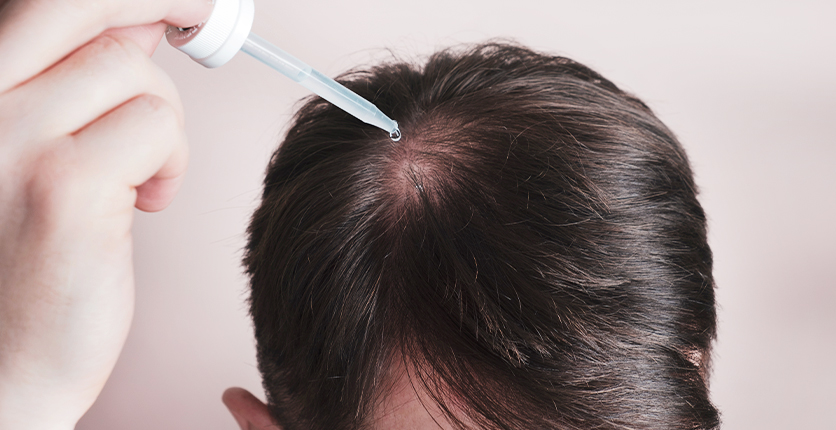
Don’t be tempted to try every product claiming to prevent hair loss and give you back your crowning glory. Unfortunately, Dr Foo says that most of them are ineffective.
“However, products containing minoxidil may be effective, as it is a proven medication to help retard hair loss due to androgenetic alopecia,” he notes.
“It may even promote the thickening of hair in some individuals.”
How to tell if you should see a doctor
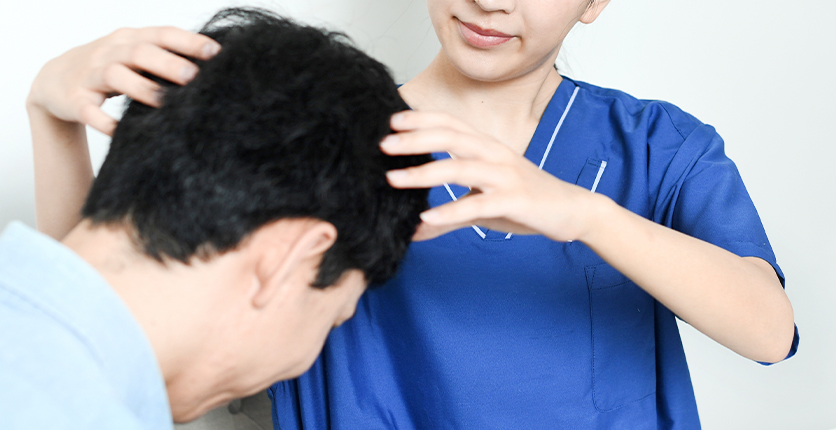
If your hair loss is so excessive that it’s starting to concern or scare you, if you’ve recently started taking certain medications and notice that you’re losing more hair than usual, or if your scalp is inflamed, irritated, itchy or scaling and hair loss in those areas appears to be patchy, then it might be a good idea to consult a doctor.
You may also wish to seek medical help if your hair loss has started affecting you emotionally – for instance, it’s causing you immense stress and you feel anxious or depressed about it.
Yes, it may be distressing having to confront hair loss while you’re in your 30s or 40s, but remind yourself that there are ways to deal with it. Besides seeking support or treatment from a medical professional or a trichologist (someone who specialises in treating hair and scalp problems), share your feelings with your loved ones to ease your emotional stress. More importantly, focus on what you can control, such as your overall health and other aspects of your physical appearance.
SAFRA members enjoy member rates on health screenings at Raffles Medical clinics. For more details, click here.
For the full list of healthcare benefits, go to safra.sg/promotions/
